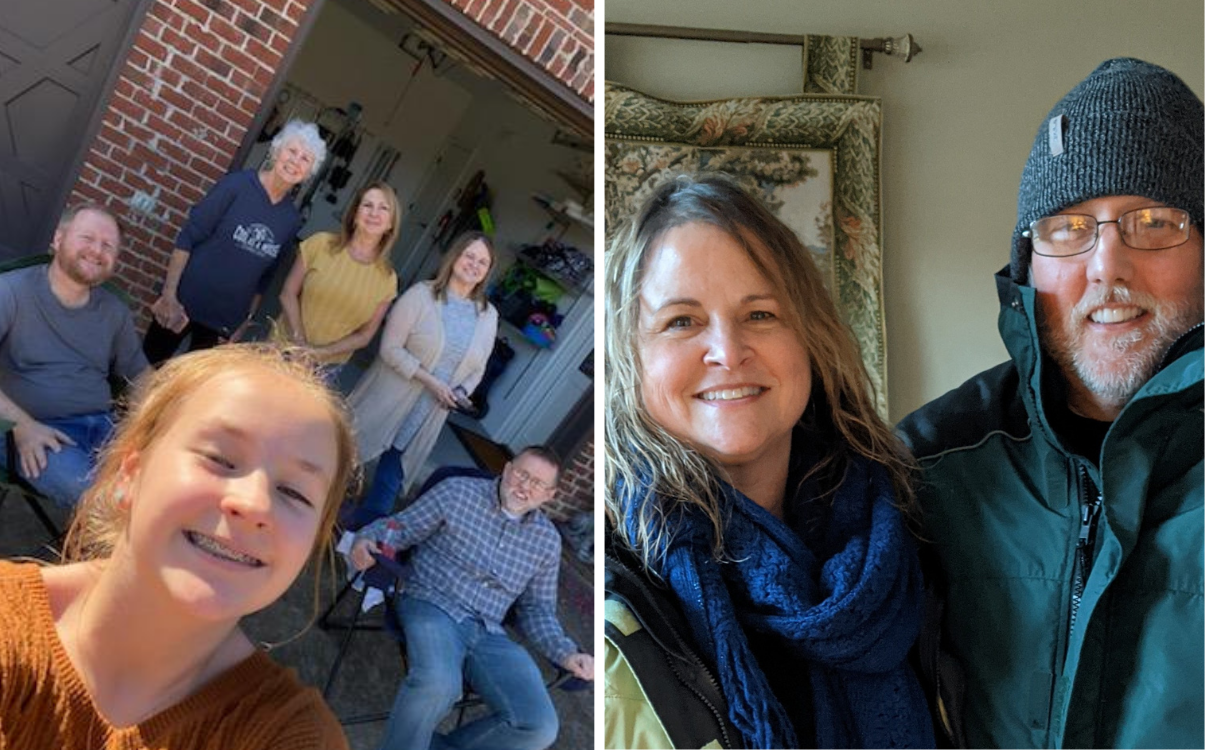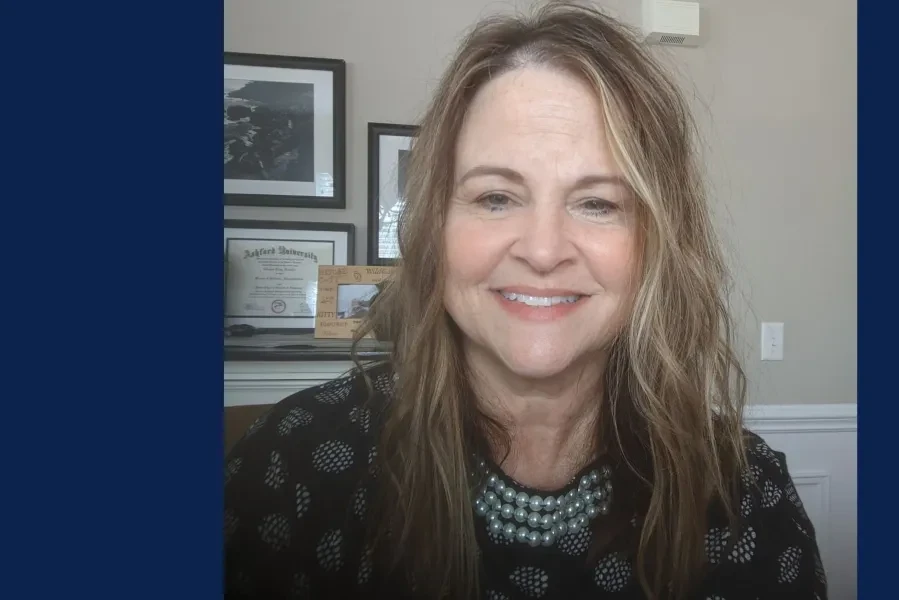The old adage goes, “Seeing is believing,” but for Virginia "Ginger" Brasher, it’s often the opposite.
Ginger is on a mission to be an advocate and shed light on an issue that affects people of all ages and backgrounds — invisible disabilities.
Ginger is a business support representative at the only pumped storage facility at the Tennessee Valley Authority, a federally owned electric utility corporation located in seven states. One of the few who is not a plant worker at her facility in Tennessee, she supports the business side of the operation. But it’s her leadership in the company’s group called A.B.L.E.D, where she has found her purpose and fostered a passion for helping others.
Relying on the skills and confidence Ginger gained from earning her Master of Business Administration (MBA) at the University of Arizona Global (UAGC) while dealing with her own disabilities, she is now a voice for others who suffer from similar issues that may not be visible. In addition to providing a safe space to educate others, Ginger also offers support for caregivers, and encourages them to focus on both the disabled person and themselves.
“I used the confidence I gained in my MBA program to talk openly about my disabilities,” she says. “I am excited to help educate people who don’t have them to know how to respond to those who do, and how to support each other.”
Adapting to Change
It’s no surprise Ginger has made invisible disabilities her passion and her platform.
Ginger was born in Georgia but had no depth perception. At the age of two, doctors recognized she had issues with her eyes. By the time Ginger was eight, she had already endured six surgeries to correct the depth perception.
That was the beginning of her lifelong struggle to face and overcome an invisible disability.
Ginger was tested again, when at age 14, she was in an automobile accident on her way to school. A car hit her family’s vehicle, and it spun 720 degrees. The force caused Ginger’s head to break the gear shift in half, which resulted in a Traumatic Brain Injury (TBI).
“I was in a coma for a week, and my left side was temporarily paralyzed,” she explains.
When she awoke, Ginger didn’t know she was now unable to walk. She released herself from the system that had her strapped down to the hospital bed and attempted to take a step. She fell, hit her head again, and caused a second TBI. And a second invisible disability.
Back on the Road to Recovery
The recovery was intense and required a lot of fortitude and self-determination.
“I had to learn to walk again, teach myself to eat, and relearn how to do many other things,” Ginger recalls.
All told, Ginger missed about six weeks of school, and her teachers assumed she wouldn’t be able to pass. But she returned and “somehow pulled good grades.”
One of the biggest changes after her accident was in how Ginger learned and processed information. Some of her preferences also changed. Previously, Ginger excelled in math and history, but after the accident, she was more interested in art and writing. It was confusing and overwhelming for the teen, but she took matters into her own hands.
“All I knew was I had to figure it out,” she says. “This was 1984, and there was no talk about situations like this. I had no resources and had to figure things out myself.”
Eventually, she graduated high school and attended a traditional college, but spent most of the time there on academic probation, eventually quitting.
Ginger attempted to earn her bachelor’s degree over the course of the next several decades at various online institutions. Her disabilities often got in the way and caused her to take long breaks and delay the completion of her programs. Finally, she returned to college in 2014 and graduated two years later.
It may have taken her a long time, but Ginger never gave up.
“The most interesting thing about me is my determination to overcome and achieve,” she says.

Mission Accomplished
After finally concluding that grueling 29-year-long pursuit to graduate from college, Ginger developed a thirst for knowledge. Thanks to encouragement from one of her managers, Ginger returned to college for a master’s degree. Based on a recommendation from that manager, she enrolled at Ashford University* to earn an MBA on a full tuition grant.
“I wanted to ensure I did not lose the knowledge I had previously gained, and also wanted to take it up a notch,” she says.
She says she chose Ashford because the class length appealed to her, as well as all the support tools the University offered.
“I also used tutors like crazy, especially to master APA format,” she notes. “The tutors were my heroes. I could get help with anything, from some very patient people. I never felt anything except encouragement each time I used them.”
The faculty also provided Ginger with the attention she needed to succeed.
“Anytime I needed something, they were there,” she notes. “When I was given feedback, I always listened to what was said and made the changes recommended. Each time I did, I grew.”
Ginger chose not to disclose her disability during her graduate studies because she was determined to earn her MBA the same way as everyone else.
What this meant was it took twice as long to accomplish every task, no matter what it was.
“I was aware of working at my own pace, participating in discussion boards, and paying attention to due dates, but for me, online learning is the best of both worlds because — since I don’t learn in a traditional way — I have the ability to adapt that learning to my needs,” Ginger explains.
And adapt she did. Ginger graduated from UAGC in 2020 at the age of 51.
“Accomplishing these goals sparked an interest in helping others who may have difficulties like I do,” she says.
Unexpected Outcomes
Since earning her MBA, Ginger has experienced a major life change.
When she first joined the disability group at the Tennessee Valley Authority, Ginger did not realize how many others dealt with issues similar to her own. After all, her colleagues hid it well.
“I work in a place where most people are men, wearing jeans, wearing hard hats and glasses. They work with their hands and can’t be disabled, because they work underground,” she explains.
She quickly recognized those with unseen disabilities needed a voice, and understood the importance of creating a conversation about these types of disabilities and educating others.
Ginger shared her story at work, and it sparked others to follow suit, bringing the issue to the forefront for many of her coworkers.
“When I came out with my disability, it really shifted their thinking at work,” she says. “Most people could not see I had any issues and didn’t understand why I had to work harder to understand something. I want to help others who have this issue find their voice and talk about their issues. I feel if I had, I could have accomplished so much more at a younger age. My disability happened at 14, but I’m talking about it in my 50s.”
Now the focus in her company is on being more open, having more understanding, and creating more mental awareness.
“There’s all different kinds of things that people don’t pay attention to or talk about, and we are making sure we are respecting everyone because when it comes to invisible disabilities, you don’t know who has what,” Ginger explains. “It could be Crohn’s disease, cancer. Migraines are debilitating.”
This process has even helped Ginger’s manager more clearly understand why Ginger reads things backwards, takes extra notes, and has her own unique way of learning and processing information.
“We’re trying to help people realize that through talking about it, changes can happen,” Ginger says.
Although working in the group has helped Ginger’s confidence, it also has allowed her to demonstrate her growth and abilities on the job.
Thanks to earning her MBA, Ginger is now made to be more part of the team. She’s included in business calls and in making decisions. They seek her insight and encourage her ideas.
Ginger credits the knowledge she gained at UAGC for this success.
“Earning my MBA taught me how to research valuable, trustworthy information,” she explains. “I learned many valuable skills I use daily, and I am able to convey my message to others in a clear and concise format. The past 10 months have been life-changing.”
--
*Ashford University is now the University of Arizona Global Campus.
Certain degree programs may not be a
